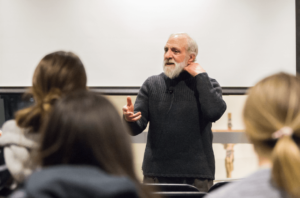by The Cowl Editor on March 1, 2018
Campus

by Sabrina Guilbeault ’18
News Editor
Last Thursday, the Providence College health policy and management department celebrated the return of professor Louis Pugliese, as he discussed his journey through the American healthcare system. After being diagnosed with leukemia two years ago, Pugliese is cancer free and is back teaching.
“I’m going to get emotional,” shared Pugliese at the start of the conversation. “It was a challenging two years.” He explained that after his more than 40-year tenure in working within the healthcare system and teaching health policy at Brown University, Salve Regina University, and PC, it was interesting to gain a patient’s perspective on the American healthcare system.
“Healthcare has been my career,” said Pugliese. “When I became a patient, all the knowledge from my career paid off in huge dividends.”
Just as he starts each of his classes, Pugliese started his discussion by playing a song. The words of the song he played, “We Are How We Treat Each Other When the Day is Done” by the Alternate Routes, were echoed throughout his story with an emphasis on being kind and treating people as people.
Pugliese, who attended high school at La Salle Academy and played basketball in Alumni Hall growing up, explained that his journey began in 2015 when he discovered blisters on his finger that would not go away. After visiting his primary care provider, he soon would learn that the blisters were not just a reaction to the cold weather but a reaction to leukemia.
After visiting an oncologist, Pugliese would be told that 95 percent of his blood had cancer.
Throughout his conversation, Pugliese often looked to his wife Charlene Pugliese to help tell his story. “When you’re with someone for that long, it’s like your one person,” he said while holding her hand.
He then explained how his diagnosis became real when, just two weeks into the semester, he had to tell his health policy and management class his news. “When I told my students, it became a reality to me,” Pugliese said. “I had this terrible disease, and all the esteemed kind of things that come with being a human came to a halt.”
Throughout his time as a teacher of health policy, Pugliese would discuss with his students the concept of bedside manner. Bedside manner can be defined as a doctor or medical professional’s attitude or approach toward a patient. “I taught my students good bedside manner,” explained Pugliese. “It’s about being able to look someone in the eyes and tell them bad news or good news.”
Pugliese experienced his first interaction of “bad bedside manner” upon seeing his first oncologist. He explained his doctor was data driven as he explained the percentage of people his age who would survive this kind of cancer. “It was dehumanizing,” he said, “and this was my first exposure to healthcare as a patient.”
“The things he said and how he said it were disheartening,” said Pugliese, who went onto explain just how important good bedside manner is as it affects the patient’s overall experience.
Pugliese would not let this interaction keep him from looking at the bright side. He explained he has goals that kept him going, including being able to teach again and walking his grandchild to school. He even created an uplifting playlist that he would listen to that became “food for his soul.” “To get myself back to where I needed to be, I drew on my music and the support of my family,” he said.
Pugliese explained that chemotherapy, although a lifesaving drug, is a brutal experience. “What chemotherapy does is kill just about every cell alive in your body,” he said. “By day three or four you feel the effects of it, and your body knows something is going on.”
It was the support from his family that Pugliese credits for helping him get his physical strength back. “My family was there all the time, it was a huge deal,” he said. He also shared how an old friend visited him every single day in the hospital and that this act of kindness allowed him to find strength.
His story and journey continued from there and included moving hospitals, connecting with old students to get the best care, and listening to the advice of his daughter. It was his reflection that showed just how thankful he was for his knowledge on the healthcare system before becoming a patient.
“Patients need to know the right information,” said Pugliese. “Teaching and working in healthcare gives you an idea of what kind of questions to ask.” He went on to say that throughout his whole experience, he was very impressed by the dedication of all his nurses.
Almost exactly two years after his diagnosis, Pugliese is back at PC. “I believe a higher energy has a plan for me, and that’s why I am back here to teach,” he said. “I feel like I have a second chance.”
“Nobody knows what tomorrow is going to bring, and I find that I like that very much,” Pugliese said. This was the first time Pugliese was given the opportunity to share his story, and he explained it was very therapeutic. “I consider myself a lucky man more now than ever before,” he said.